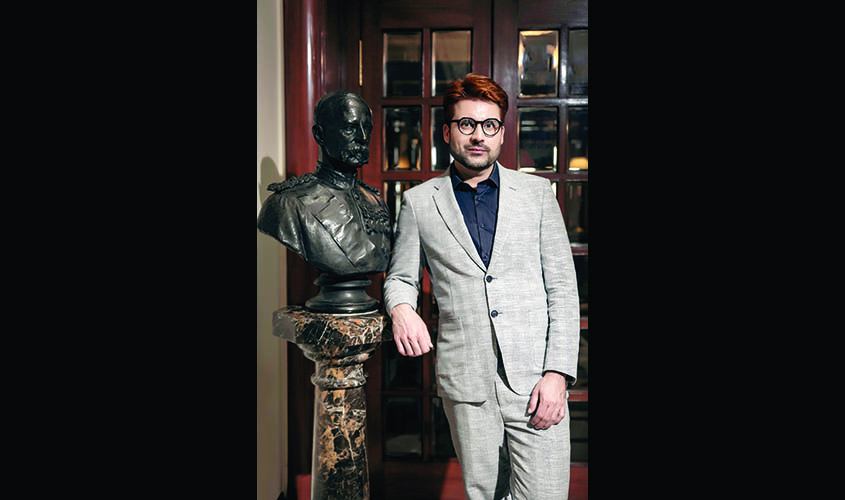Nemat Sadat’s debut novel, The Carpet Weaver, gives us a rare glimpse into 1980s Afghanistan through a poignant tale about love and homosexuality, writes Anindya Tripathi.
A refugee from belief seeks a cell tonight.
—Agha Shahid Ali
Nemat Sadat was declared a “national threat” by the Afghan government because of his support for queer rights when he was teaching at the American University of Afghanistan in Kabul in 2013. “Islam is so fragile, that a person like me can threaten it,” he says with a laugh. But of course, Sadat understands more than anyone else that state persecution is no laughing matter, having himself been a victim of that.
His debut novel, The Carpet Weaver, tells the forbidden love story of a gay man, set against the backdrop of 1980s Afghanistan. The book’s protagonist, Kanishka Nurzada, is deeply in love with his best friend, Maihan. And across the span of the narrative, he slowly but agonisingly comes to terms with his kuni (a Pashto derogatory term for homosexual) identity.
The book opens with Kanishka’s 16th birthday. A teenager confounded by his sexuality, he is reminded at every turn of the social and religious proscriptions against homosexuality in a radicalising and forbiddingly conservative Afghan culture.
This is a coming-of-age

In the 1980s, Afghanistan’s gay community was relegated to the shadows and margins—a cultural ghettoisation that led to the emergence of certain “deviant” spaces, like hammams, and localities that became preferred hangouts of gay people (several scenes of the novel are set in these zones).
Kanishka’s personal battle to accept his “different and deviant” ways is riddled with fear and anxiety. He is assailed by self-doubt, prays almost every day for Allah “to change him, so that a miracle makes him attracted towards women”. He wants to live up to his family’s, his society’s expectations.
“I have the same identity as Kanishka. We’re both gay, Afghan and refugees. And I am so happy that my book is starting a conversation even in the LGBTQ+ community, owing to my intersectional identity, as an ex-Muslim and a gay man,” says Sadat, who now lives in the United States, and was recently in Delhi to promote his novel.
It took him almost a decade to write this book and he says that he was inspired by the liberal turn in American politics, with Barack Obama’s Presidential victory in 2009. With The Carpet Weaver, Sadat hopes to initiate a movement that ultimately results in a more “gay-friendly” world, and believes that the book is well-timed and well-positioned to do so, especially here in India, a nation that has only recently decriminalised homosexuality.
Sadat’s journey, like Kanishka’s, wasn’t an easy one. He has faced death threats, a fatwa, a total boycott from the Afghan community settled in the US, and has even struggled to get his family on his side.
In Afghanistan, during his stint as an assistant professor of political science, he says he received a mixed response to his sexual identity. While some of his students accepted him, most tried to shun him, even refusing to attend his lectures. The locals by and large turned against him.
The novel, too, faced its share of difficulties. Many publishers in the liberal West rejected the manuscript—450 rejections in total—on the grounds that the story was “too controversial”.
Speaking on being gay and Muslim, Sadat says, “I don’t need to validate my existence as a Muslim man when Islam in itself is very clear about its stance on homosexuality. In Sharia, the killing of homosexuals is allowed as homosexuality is considered the worst sin in Islam. LGBTQ+ people are criminalised three times in Islam, firstly for liwat or sodomy, second by zina or having unlawful sexual relations outside of a heterosexual marriage, and third for assuming a queer identity.”
According to him, this queer identity threatens to dismantle the predominance of conservative Islamist forces in Afghanistan. And his novel gives us a sense of how being Muslim and homosexual in that culture can be a very confusing and very vulnerable state to be in.
Sadat was born 1979 in Afghanistan. He left the country with his family when he was eight months old. Yet he absorbed the culture, the folklores and the social ethos of the Afghan community through his family and through members of the Afghan diaspora in the US.
His book details many of these cultural and social markers from Kabul’s “golden era”, offering glimpses of an Afghanistan that differs from the usual portrayals of the country—as a battle-scarred wilderness—that we have got used to in the last two decades.
The Carpet Weaver marks a departure from all those generic books—novels and nonfiction alike—written about the region. It describes the beauty of Afghanistan as much as it delves into the story of Kanishka and gives us a cultural history of the gay community there.
“Someday I wish to return to Afghanistan and not be stoned for loving a man,” says Sadat. “People have started coming out in this generation due to world events and increasing acceptance. Thanks to social media, we have pride parades taking place all over the world, and this has started a conversation in average households, too. Be it Botswana or India, we are seeing homosexuality being decriminalised worldwide. About time that Afghanistan, too, made a move towards it. The best part is that this book has found a home in India, so now conservative Afghans cannot call this ‘Western propaganda’. I feel India’s move has provided a huge impetus to the fight for gay rights worldwide.”

